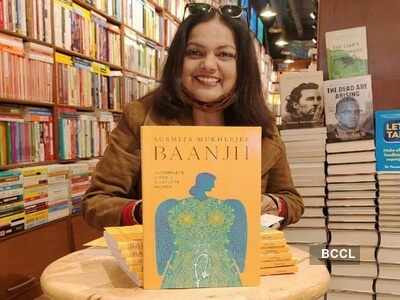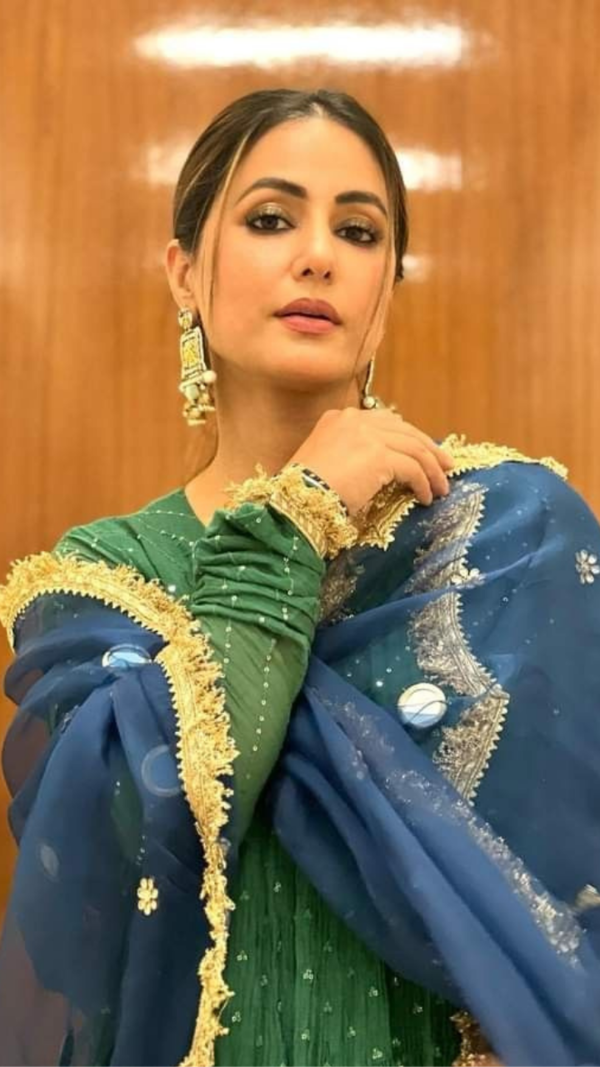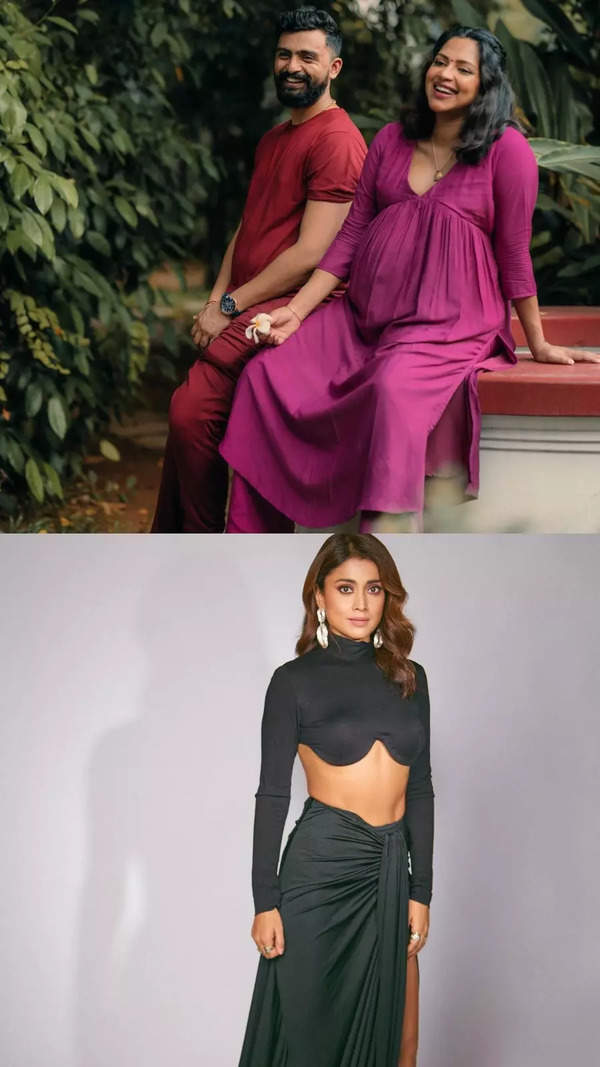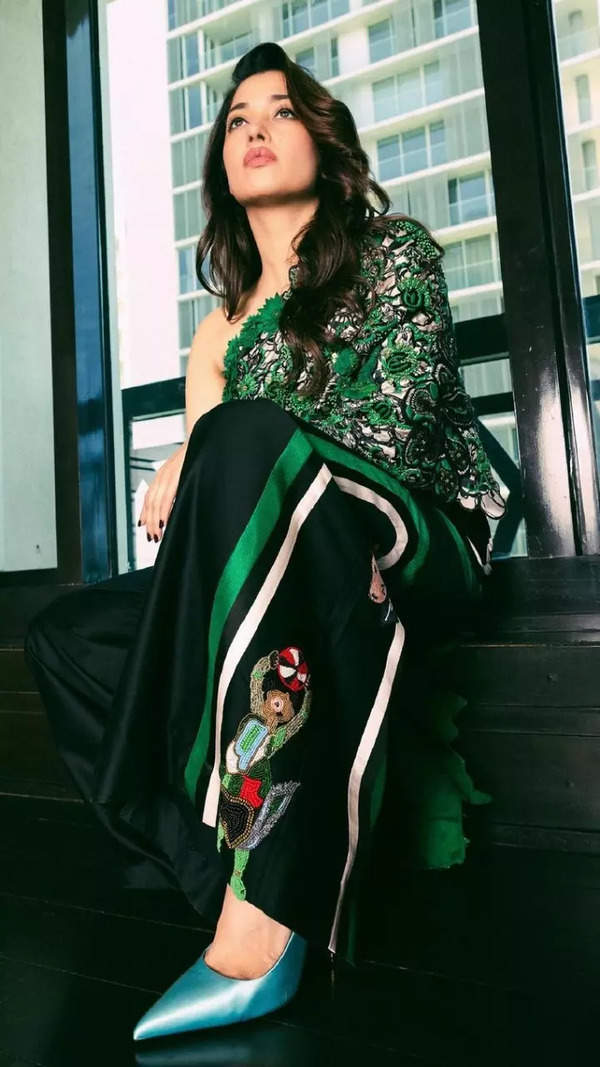- News
- lifestyle
- books
- interviews
- If you are passionate about something, then things happen: Susmita Mukherjee on writing 'Baanjh'
Trending
This story is from May 24, 2021
If you are passionate about something, then things happen: Susmita Mukherjee on writing 'Baanjh'
In an exclusive interview, Susmita Mukherjee talks about her journey as a writer, her career and why she thinks everyone should pen their stories. Excerpts:

Susmita Mukherjee (Photo: Readomania/ Twitter)
You may remember her for her onscreen roles but did you know that apart from being an actor, Susmita Mukherjee is also a producer, director, entrepreneur and writer? Susmita Mukherjee's new book titled 'Baanjh: Incomplete Lives of Complete Women' has been published by Readomania this year. 'Baanjh' is a collection of 11 short stories and, as the title suggests, each story is centered on women from different walks of life.In an exclusive interview, the multi-talented Susmita Mukherjee talks about her journey as a writer, her career and why she thinks everyone should pen their stories. Excerpts:
1. What were the inspirations behind writing these short stories in 'Baanjh'?
The stories aren't inspired from real life, but from experiences I have had. I have lived in Bengal, Delhi, Bundelkhand, Mumbai and I've experienced different cultures. Talking about the stories in this collection, 'Baanjh' is a village story about a Thakurain who cannot bear children. Then there's another story which is about migrants from Bihar and UP in Mumbai. I had once gone to drop my maid behind Infinity Mall in Mumbai and that's where I got this idea to write about migrant workers. There's another story titled 'The Unwritten Love Letter' in the book which is about a famous actress Shalimar. She is having an affair with a hero; she goes to a hotel in Juhu to meet the hero's wife. Shalimar is worried about the meeting. The story is written as an unwritten love letter to the wife by Shalimar seeking love, identity and attention. It is just an idea-- I haven't met these people.
One story which resonates the most with me from this book is 'Memories of a Red Nose', it's about a mother-daughter relationship. It's last line still tears me up, whenever I read it. There's something deep in that story that I'm not aware of.
2. You wrote these short stories over a period of some 30 years...
Yes, I wrote these stories over 38 years roughly. I was into acting at that time and simultaneously I was also doing production. So in between work these ideas would come to me and I would jot them down. Whenever I sat down to write, I wrote the stories in one go-- I really didn't plot these stories... Things and life have changed so much over the last 40 years and these stories represent me in different phases of my life.
3. Apart from being an actor, you have also written plays, a book, and now short stories. Tell us about your journey as a writer.
In 1993 I wrote a screenplay called 'Natti'; when it didn't come out as a movie we made it into a play. It is like my first actual work out in the world! And then I was also ghost writing for my husband's company. Subsequently I was always writing these stories... I'm talking of some 30-35 years ago. Back then I thought why write, when I'm already into acting. Nowadays, of course, everyone multi-tasks. In 2018 my first book 'Me and Juhi Baby' was published by Speaking Tiger.
4. What is the toughest to write for you-- plays, screen plays, short stories, or novels? And why?
To be honest, I can't actually place it like that. I initially did study screenplay writing, but subconsciously my background in literature must have helped. I wasn't reading much after my masters in English literature from Miranda House in Delhi, but all that must have been inside somewhere. So, writing just came naturally to me.
5. You are an actor, entrepreneur and writer. How do you manage your time?
Apart from acting, theatre and writing, I'm an entrepreneur too. We have a homestay in Orchha, we run an NGO, we also have an art village in Orchha and we're trying to get Bundelkhand on the culture map. We are also organising the Khajuraho Literature Festival for the last six years. In my personal life, my children are now grown up. Talking about juggling between work, life and writing-- on some days I manage well while some other days are a disaster. But I write whenever I get time, though of course one does get a writer's block. Sometimes you feel very dry-- it's just like life.
Also, I'm not a laptop person. I have this blue register in which all my stories are scribbled. If I am inspired, then I'll sit on the desk and finish my writing. I don't think about whom I'm writing it for. And, you know how it is for women-- when you are a working woman you have to multitask! But if you are passionate about something, then things happen.
6. Tell us about your favourite writers.
I love Chitra Banerjee Divakaruni and Jhumpa Lahiri's writings. In classics, I like O Henry and Orhan Pamuk's works.
7. Any tips for aspiring writers?
Get over your fear because every human being has a story to tell. In today's digital age you don't have to wait for a publisher, you can get it self-published. Sometimes people say 'Oh but this has been done before' but I think that someone has done something as per their perspective. There are only seven raags; you can't say that you are following each other! Also, you have to be driven by hunger and passion. You have to write your story and not be a self-critic. Believe that you have something so fabulous to write and you have to do that.
I believe each of us are so unique and have such fabulous things to say. Every human has an art which they should share.
8. What are you working on next?
I have written a novel during called 'Beyond Khajuraho'. It's about a father-son duo and it's also my first crime thriller. I had written it in 2008 as a film script and given it to production houses. I wrote the story as a novel now. I was more disciplined while writing this book-- I was under the Covid lockdown and wrote 10 pages daily; though I had the basic structure in place, it changed a lot. Otherwise, I write whenever and wherever I can.
I'm also working on two other subjects. It is a great feeling because you write for yourself and then you share it with the world.
1. What were the inspirations behind writing these short stories in 'Baanjh'?
The stories aren't inspired from real life, but from experiences I have had. I have lived in Bengal, Delhi, Bundelkhand, Mumbai and I've experienced different cultures. Talking about the stories in this collection, 'Baanjh' is a village story about a Thakurain who cannot bear children. Then there's another story which is about migrants from Bihar and UP in Mumbai. I had once gone to drop my maid behind Infinity Mall in Mumbai and that's where I got this idea to write about migrant workers. There's another story titled 'The Unwritten Love Letter' in the book which is about a famous actress Shalimar. She is having an affair with a hero; she goes to a hotel in Juhu to meet the hero's wife. Shalimar is worried about the meeting. The story is written as an unwritten love letter to the wife by Shalimar seeking love, identity and attention. It is just an idea-- I haven't met these people.
One story which resonates the most with me from this book is 'Memories of a Red Nose', it's about a mother-daughter relationship. It's last line still tears me up, whenever I read it. There's something deep in that story that I'm not aware of.
So, the stories in 'Baanjh' are about people who have caught my attention. I haven't met them, but the feelings and emotions are there in the stories. Every story is different in this collection. Short stories are like a rainbow-- they are written to express the ideas and there's no particular genre to them.
2. You wrote these short stories over a period of some 30 years...
Yes, I wrote these stories over 38 years roughly. I was into acting at that time and simultaneously I was also doing production. So in between work these ideas would come to me and I would jot them down. Whenever I sat down to write, I wrote the stories in one go-- I really didn't plot these stories... Things and life have changed so much over the last 40 years and these stories represent me in different phases of my life.
3. Apart from being an actor, you have also written plays, a book, and now short stories. Tell us about your journey as a writer.
In 1993 I wrote a screenplay called 'Natti'; when it didn't come out as a movie we made it into a play. It is like my first actual work out in the world! And then I was also ghost writing for my husband's company. Subsequently I was always writing these stories... I'm talking of some 30-35 years ago. Back then I thought why write, when I'm already into acting. Nowadays, of course, everyone multi-tasks. In 2018 my first book 'Me and Juhi Baby' was published by Speaking Tiger.
4. What is the toughest to write for you-- plays, screen plays, short stories, or novels? And why?
To be honest, I can't actually place it like that. I initially did study screenplay writing, but subconsciously my background in literature must have helped. I wasn't reading much after my masters in English literature from Miranda House in Delhi, but all that must have been inside somewhere. So, writing just came naturally to me.
5. You are an actor, entrepreneur and writer. How do you manage your time?
Apart from acting, theatre and writing, I'm an entrepreneur too. We have a homestay in Orchha, we run an NGO, we also have an art village in Orchha and we're trying to get Bundelkhand on the culture map. We are also organising the Khajuraho Literature Festival for the last six years. In my personal life, my children are now grown up. Talking about juggling between work, life and writing-- on some days I manage well while some other days are a disaster. But I write whenever I get time, though of course one does get a writer's block. Sometimes you feel very dry-- it's just like life.
Also, I'm not a laptop person. I have this blue register in which all my stories are scribbled. If I am inspired, then I'll sit on the desk and finish my writing. I don't think about whom I'm writing it for. And, you know how it is for women-- when you are a working woman you have to multitask! But if you are passionate about something, then things happen.
6. Tell us about your favourite writers.
I love Chitra Banerjee Divakaruni and Jhumpa Lahiri's writings. In classics, I like O Henry and Orhan Pamuk's works.
7. Any tips for aspiring writers?
Get over your fear because every human being has a story to tell. In today's digital age you don't have to wait for a publisher, you can get it self-published. Sometimes people say 'Oh but this has been done before' but I think that someone has done something as per their perspective. There are only seven raags; you can't say that you are following each other! Also, you have to be driven by hunger and passion. You have to write your story and not be a self-critic. Believe that you have something so fabulous to write and you have to do that.
I believe each of us are so unique and have such fabulous things to say. Every human has an art which they should share.
8. What are you working on next?
I have written a novel during called 'Beyond Khajuraho'. It's about a father-son duo and it's also my first crime thriller. I had written it in 2008 as a film script and given it to production houses. I wrote the story as a novel now. I was more disciplined while writing this book-- I was under the Covid lockdown and wrote 10 pages daily; though I had the basic structure in place, it changed a lot. Otherwise, I write whenever and wherever I can.
I'm also working on two other subjects. It is a great feeling because you write for yourself and then you share it with the world.
End of Article
FOLLOW US ON SOCIAL MEDIA









